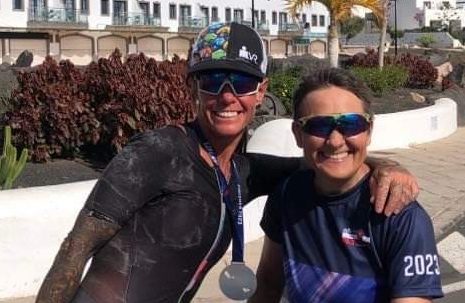My run-walk-run had been reduced to just-keep-inching-forward by the time Christine Piché caught me in the last two km of Ironman 70.3 Lanzarote last March.
“Go, Canada!” I heard her say as she drew up alongside me. “You can do it.”
I tried to match her pace for 40 or 50 metres, energized by her enthusiasm, but I’d been done in by the Canary Islands’ infamous wind on the bike course, and Piché soon pulled ahead — finishing the biggest test of her triathlon career to date near the back of the pack, but proud to have crossed the line with time to spare.
“That was the hardest race I’ve ever done,” Piché confessed when I ran into her soon after in the recovery zone. “But what a good test. Now I have an idea of how much work I still need to do to be ready for Canada Man!”
If you had told Piché a decade ago she’d be laser-focused on preparing for Canada Man/ Woman, the country’s toughest triathlon, this July long weekend, she’d have called you crazy.
Hell and back
She had been through hell and back by then: abandoned by her mother when she was four years old, she’d grown up in youth protection, shuffled from foster home to foster home, sometimes attending four or five schools in a single year. Abused, sexually assaulted, with no trustworthy adult to help instill a moral compass, by her early 20s Piché found herself with the “worst kind of man you can imagine,” literally held captive. It took her nearly five years to escape that violent relationship, and the experience left her responding to the world “like a vicious dog,” she says. Filled with anger and self-loathing, Piché drank herself into oblivion, freebasing cocaine, injecting heroin — there is little she did not do in her desperation to suppress her past.
Rock bottom meant making a choice
Then came a day when she couldn’t take it anymore.
“You reach a point where you hit rock-bottom and you have to choose: do I die or do I change my life,” says Piché. She was 38 years old, her body wrecked from booze and drugs and all her misadventures, but she started running — at first, just for the endorphin rush that she craved, and to calm herself down and help her to sleep.
“I chose a better addiction,” she says, laughing. She did her first half-marathon within months of getting sober and a Spartan race not long after that.
Piché is bound by the rules of her recovery program not to share the identity of the person who pointed her in the direction of…
Click Here to Read the Full Original Article at Canadian Cycling Magazine…

